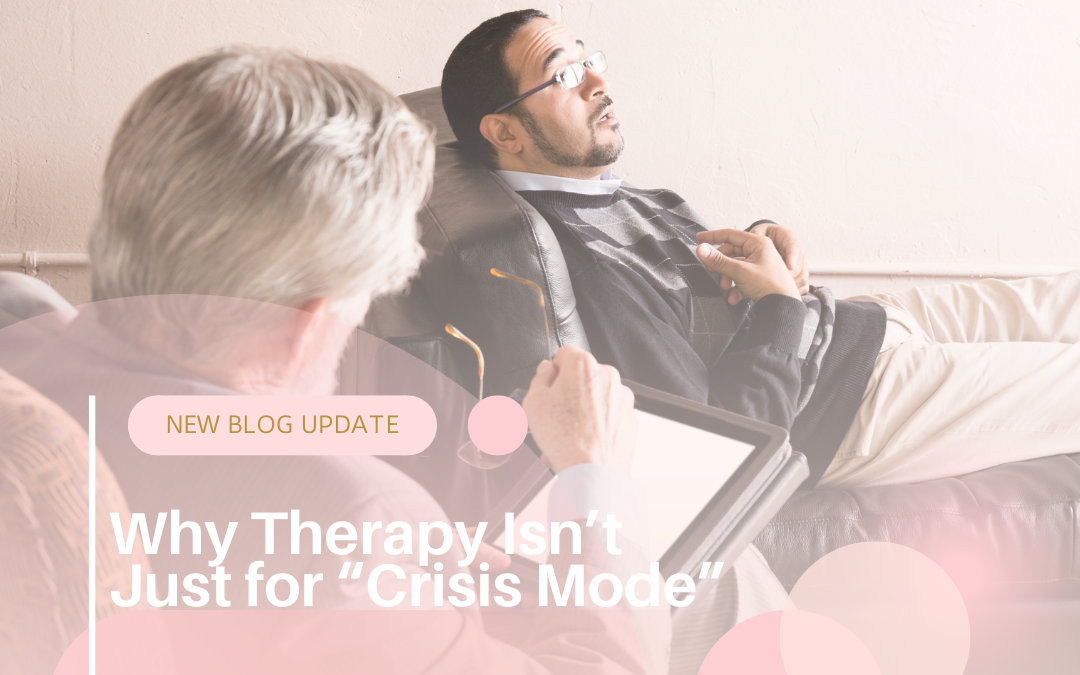When most people think about therapy, they often imagine someone in the middle of a crisis—struggling with anxiety attacks, grieving a major loss, or dealing with a severe bout of depression. While therapy absolutely offers critical support in those moments, it’s a common misconception that you have to be in emotional distress to “qualify” for therapy.
In reality, therapy is just as valuable for prevention, growth, and maintenance as it is for healing. Here’s why therapy isn’t just for crisis mode—and why you might consider it even when things are going “okay.”
Therapy as Preventative Care
Just like we see a primary care doctor for regular checkups or go to the dentist for cleanings, therapy can be part of your emotional and mental wellness routine. Regular sessions can help you:
-
Identify unhealthy patterns early
-
Strengthen emotional regulation skills
-
Build resilience before life throws a curveball
-
Explore parts of yourself you may not have time or space to process otherwise
Preventative mental health care helps you become more self-aware and better equipped to handle stress, transitions, or conflicts before they escalate.
It’s a Space for Growth—Not Just Healing
Therapy isn’t only about fixing what’s broken—it’s also about expanding your understanding of yourself and enhancing your quality of life. Many clients use therapy to:
-
Explore career transitions or life goals
-
Improve communication and relationships
-
Unpack values, beliefs, or identity questions
-
Enhance creativity and confidence
These growth-based conversations create space for intentional living, even in the absence of immediate distress.
Processing Daily Life & Minor Stressors
Life can be overwhelming—even when it’s not a full-blown crisis. Therapy can support you in navigating:
-
Work stress or burnout
-
Family or parenting challenges
-
Conflicts with friends or partners
-
Self-esteem or body image issues
-
Decision fatigue or emotional overload
Addressing these “everyday” stressors in therapy allows you to respond thoughtfully instead of reacting impulsively.
Therapy Builds Lifelong Skills
What you learn in therapy doesn’t just stay in the therapy room. You gain practical tools for:
-
Managing conflict
-
Setting boundaries
-
Communicating clearly
-
Practicing mindfulness
-
Understanding your nervous system
These skills make day-to-day life more manageable and fulfilling, and they build a stronger foundation for when big life moments do arrive.
You Don’t Have to Hit Rock Bottom to Get Support
One of the biggest myths about therapy is that you have to wait until things are “bad enough” to reach out. But just like you wouldn’t wait for a tooth to rot before going to the dentist, your emotional well-being deserves consistent attention too.
Therapy is a proactive act of self-respect—not a sign of weakness.
Final Thoughts: You Deserve Support, Always
You don’t need to earn therapy by being in pain. Therapy can be a place where you invest in yourself—where you pause, reflect, and realign with who you want to be. Whether you’re navigating a storm or simply trying to stay steady, therapy is for you.
At Central Valley Family Therapy, we believe everyone deserves compassionate care—no matter where they are in their journey.


Recent Comments